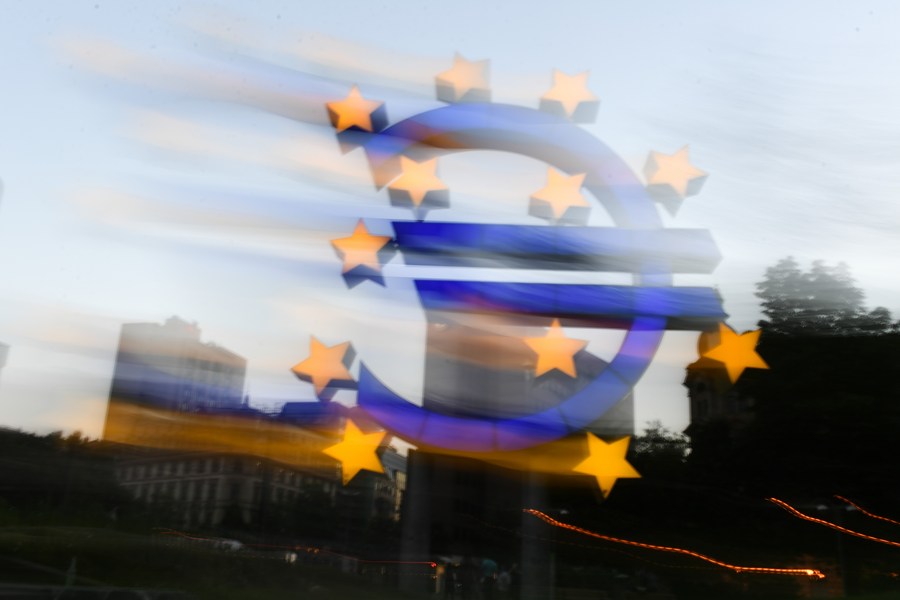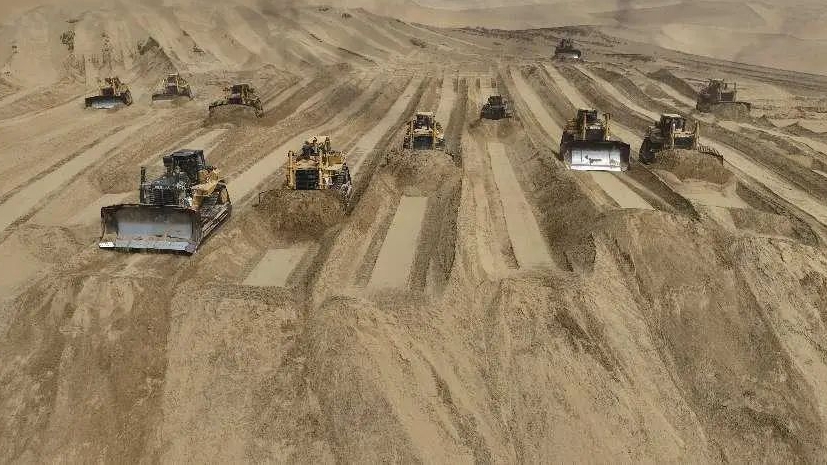EU leaders to discuss Ukraine, energy, economy in Prague summit

Photo taken on June, 1 2022 shows the Euro sculpture in Frankfurt, Germany. (Xinhua/Lu Yang)
PRAGUE, Oct. 4 (Xinhua) -- Prague, the capital of the Czech Republic that currently holds the rotating Presidency of the Council of the European Union (EU), will host an informal EU summit later this week.
On Friday, the leaders of the EU member states are set to discuss the Russia-Ukraine conflict, the rising costs of energy and its economic ramifications -- the three most pressing issues facing the bloc. On Thursday, the summit will be preceded by the inaugural meeting of the European Political Community (EPC).
EU+ GATHERING
The brainchild of French President Emmanuel Macron, the EPC serves as a platform for political coordination for European countries. It aims to promote political dialogue and cooperation on issues of common interest to strengthen the continent's security and stability.
The EPC meeting in Prague, the first of its kind, will bring together leaders of over 40 European countries. Besides the 27 EU member states, several Western Balkan nations, Ukraine, Moldova, Georgia and non-EU countries that are deeply integrated in the single market -- such as Norway and Switzerland -- as well as the United Kingdom (UK) and Turkey have been invited to the so-called "EU+" gathering.
UK Prime Minister Liz Truss is reported to have decided to attend the meeting, as it gives her country "an opportunity to shape a new European forum from the inside after Brexit." London has also suggested hosting one of the next EPC meetings.
Turkish President Recep Tayyip Erdogan will also join the meeting, Czech media reported, citing the Turkish ambassador to the Czech Republic. Greece has said it is open to a meeting between Prime Minister Kyriakos Mitsotakis and Erdogan in Prague amid a recent escalation of tensions between the two neighbors over their disputes in the Aegean Sea.
According to the Czech EU Council Presidency, the participants will discuss security and peace, energy, climate and economy. They are also expected to debate the platform's future settings, including the frequency of meetings and the host countries. However, the EU has said that "no formal written outcome of the EPC is envisaged."
ENERGY SECURITY
The Russia-Ukraine conflict has had a "dramatic impact" on the energy situation in Europe, with a spillover effect on the economy, according to European Council President Charles Michel.
"Our primary objective is to ensure that we guarantee security of supply and affordable energy for our households and businesses, particularly as the winter cold approaches," he said. "We will assess the decisions already taken in this regard and give guidance on further action needed to ensure a well-coordinated European response."
Last week, the EU member states' energy ministers reached a political agreement on a series of emergency measures, including reducing electricity use and capping the revenues of electricity producers, in a bid to mitigate the current high energy prices. However, the member states remain divided on capping natural gas prices.
EU leaders will also examine ways to protect their countries' critical infrastructure. Several leaks have been detected recently on the Nord Stream 1 and 2 gas pipelines in the Baltic Sea near Denmark and Sweden, an incident reportedly being investigated as probable sabotage.
Describing the incidents as a "threat to the EU," Michel tweeted that "We are determined to secure our critical infrastructure. Leaders will address this at the upcoming summit in Prague."
The leaders will also discuss the overall economic situation. Inflation in the eurozone rose by 10 percent in September, a new record high since the launch of the single currency in 1999. Energy prices, which rose by 40.8 percent in September from a year ago, were once again the main contributor to accelerating inflation.
NEW SANCTIONS
In his invitation letter to EU member states for the Prague summit, Michel said the leaders will discuss ways to continue providing "strong economic, military, political and financial support" to Ukraine, while strengthening "our restrictive measures to further increase pressure on Russia."
The European Commission, the EU's executive arm, last week proposed the eighth round of sanctions against Russia. The proposed sanctions package will further restrict trade to "isolate and hit Russia's economy even more," and includes additional export bans on key technologies used for the military.
The EU countries are reportedly getting close to agreeing on the package, which is expected to be approved this week.
In the EU, sanctions decisions require unanimity, and among the member states the government of Hungary has been a vocal opponent of sanctions against Russia.
Hungary's Prime Minister Viktor Orban said late last month that with the sanctions, Europe has "shot itself in the foot."
"European people have become poorer (because of the sanctions), while Russia has not fallen to its knees," he argued, adding that families across Europe were paying the price of the sanctions in their energy bills.
In Prague, two demonstrations were held in September against the Czech government's handling of the energy crisis, calling for, among others, the country's military neutrality and direct contracts with gas suppliers -- primarily with Russia -- to alleviate the burden of high energy prices.
Photos
Related Stories
- US doesn’t see Ukraine as NATO ally, but as de facto cannon fodder
- China urges leaving space for resolving Ukraine crisis through diplomatic negotiations
- EU ministers agree to impose emergency measures to reduce energy prices
- Exports to EU rise as winter nears
- Ukraine unveils mechanism for post-conflict reconstruction
- EU executive proposes 8th package of 'biting sanctions' against Russia
- Erdogan, Zelensky discuss Ukraine crisis over phone
- Ukraine needs 15 bln USD to restore farmland irrigation network: official
- Russia-Ukraine conflict ‘to enter new stage’ after referendums
- Ukraine's seaports ship more than 5 mln tons of foodstuffs under grain deal
Copyright © 2022 People's Daily Online. All Rights Reserved.









